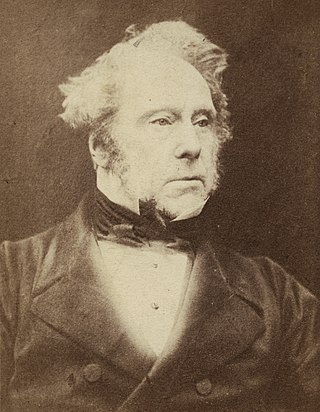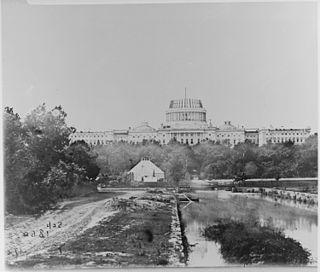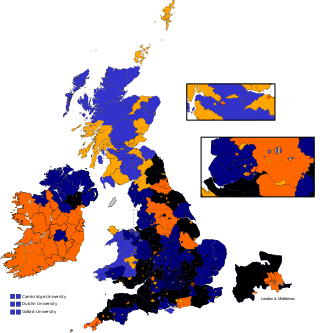
In the 1857 United Kingdom general election, the Whigs, led by Lord Palmerston, won a majority in the House of Commons as the Conservative vote fell significantly. The election had been provoked by a vote of censure in Palmerston's government over his approach to the Arrow affair which led to the Second Opium War.
The Peelites were a breakaway dissident political faction of the British Conservative Party from 1846 to 1859. Initially led by Robert Peel, the former Prime Minister and Conservative Party leader in 1846, the Peelites supported free trade whilst the bulk of the Conservative Party remained protectionist. The Peelites later merged with the Whigs and Radicals to form the Liberal Party in 1859.
Londonderry was a parliamentary constituency in Northern Ireland represented in the House of Commons of the UK Parliament, as well as a constituency in elections to various regional bodies. It was replaced in boundary changes in 1983. Londonderry returned two MPs (1801–1885) and later one (1922–1983).

Great Yarmouth is a constituency represented in the House of Commons of the Parliament of the United Kingdom since the 2010 general election by Sir Brandon Lewis, a Conservative.

York was a constituency represented in the House of Commons of the Parliament of the United Kingdom until 2010. It elected two Members of Parliament (MPs) until 1918, and one thereafter by the first past the post system of election. From 1997 to 2010 it was known as City of York.

The 35th United States Congress was a meeting of the legislative branch of the United States federal government, consisting of the United States Senate and the United States House of Representatives. It met in Washington, D.C. from March 4, 1857, to March 4, 1859, during the first two years of James Buchanan's presidency. The apportionment of seats in the House of Representatives was based on the 1850 United States census. Both chambers had a Democratic majority.
Huntingdonshire was a Parliamentary constituency covering the county of Huntingdonshire in England. It was represented by two Members of Parliament in the House of Commons of England until 1707, then in the House of Commons of Great Britain from 1707 to 1800, and then in the House of Commons the Parliament of the United Kingdom from 1801 to 1885.

East Sussex was a parliamentary constituency in the county of Sussex, which returned two Members of Parliament to the House of Commons of the Parliament of the United Kingdom, elected by the bloc vote system.
The Representation of the People (Scotland) Act 1832 redefined the boundaries of Scottish constituencies of the House of Commons of the Parliament of the United Kingdom, and the new boundaries were first used in the 1832 general election.

The 1857 United States Senate election in New York was held on February 3, 1857 by the New York State Legislature. Incumbent Whig Senator Hamilton Fish did not stand for re-election. The seat was won by Preston King, a former U.S. Representative and member of the newly-formed Republican Party. King was the first Republican elected to represent New York, although William H. Seward had joined the party after being elected as a Whig in 1855.

The 1856–57 United States Senate elections were held on various dates in various states. As these U.S. Senate elections were prior to the ratification of the Seventeenth Amendment in 1913, senators were chosen by state legislatures. Senators were elected over a wide range of time throughout 1856 and 1857, and a seat may have been filled months late or remained vacant due to legislative deadlock. In these elections, terms were up for the senators in Class 1.

The 1860–61 United States Senate elections were held on various dates in various states. As these U.S. Senate elections were prior to the ratification of the Seventeenth Amendment in 1913, senators were chosen by state legislatures. Senators were elected over a wide range of time throughout 1860 and 1861, and a seat may have been filled months late or remained vacant due to legislative deadlock. In these elections, terms were up for the senators in Class 3.
The 1857 United States Senate election in Massachusetts was held in January 1857. Incumbent Charles Sumner was re-elected to a second term in office as a member of the Republican Party. Sumner was elected in 1851 by a single vote after twenty-five inconclusive ballots by a coalition of Free-Soil and Democratic legislators. He had since become a founding member of the Massachusetts Republican Party.
The list of by-elections in the United Kingdom is divided chronologically by parliament:

The 1857 New Hampshire gubernatorial election was held on March 10, 1857.